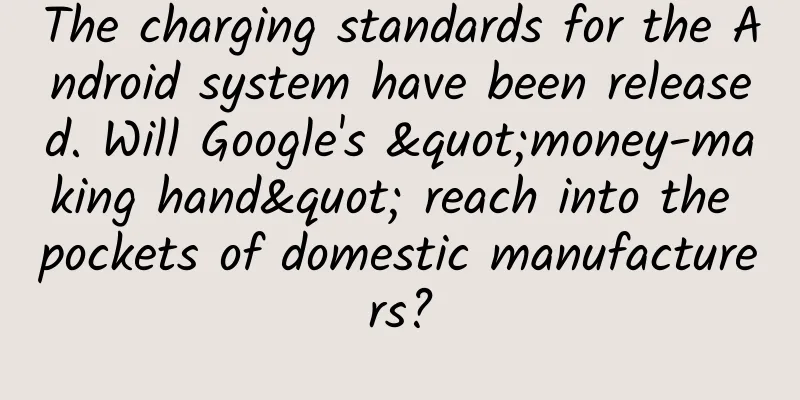The charging standards for the Android system have been released. Will Google's "money-making hand" reach into the pockets of domestic manufacturers?

|
According to reports, Alphabet's subsidiary Google will charge hardware companies up to $40 per device for licensing the Android system. The fee will take effect on October 29 and apply to all new smartphones and tablets released in Europe and running Google's Android operating system. The topic of charging for the Android system has been discussed many times, including the expiration of the additional agreement that made the Android system free for five years when Google acquired Motorola. This time, Google seems to be serious. Google's announcement of the Android system charging standards and its implementation in the European market was not without warning. Not long ago, the European Union filed a complaint against Google's parent company Alphabet on the grounds that "Google abused its dominant position in the Android field" and issued a sky-high fine of 4.34 billion euros. At the same time, if the rectification is not up to standard, Google's parent company Alphabet will receive another super-high fine of 5% of its annual turnover. At that time, Google CEO's response, "The EU's decision may affect Android's free business model in the future," sent a signal that the paid era of the Android system may be coming. What does the release and implementation of the Android system charging standards mean to Google? According to data released by research firm Gartner on the market share of smartphone systems sold worldwide in 2017, Android's market share reached 85.9%, a height that no one can match. I roughly calculated that according to the data report released by market research company IHS Markit, the global smartphone ownership will maintain a high and effective growth rate of 50% in the next few years, and the global smartphone ownership will reach 6 billion by 2020. By 2020, the global smartphone ownership with Android system will reach 5.15 billion. Taking the average Android system licensing fee of $20 as the calculation, Google will increase its operating income by at least $100 billion due to the opening of the paid use model of the Android system. I checked the 2017 financial report released by Google's parent company Alphabet, and the total revenue was $110.8 billion. After the Android paid model is opened, Google's revenue may double. The Android system is charged. What impact will it have on Android manufacturers, or more precisely, on domestic mobile phone manufacturers? At present, Google is only implementing the Android system charging standard for the European market. It is still unknown whether it will push the charging model to the global market after trial. The author speculates that Google's move may be an indirect response to the EU's fine with practical actions. According to the 2018Q2 global smartphone shipment data released by Gartner Group, the top five global smartphone manufacturers, except for Apple and Samsung, are Huawei, Xiaomi, and OPPO, all of which are domestic manufacturers. If the real payment model is fully opened, the domestic mobile phone manufacturers will naturally be the most affected. The charging standards for the Android system have been released and will soon be implemented. Will Google extend its "money-making hand" to the pockets of domestic mobile phone manufacturers? The additional agreement that allowed Android to be free for five years has expired. Under the EU's ruling, Google's carefully balanced business model built around Android, which does not require charging mobile phone manufacturers for the technology it provides, has been broken. Google has enough reason to talk about the charging standard. With the EU's intervention, Google has taken advantage of the situation to push the paid model across the board. On the one hand, it seems to be a last resort, but on the other hand, isn't it a pleasure? As roughly calculated above, with a revenue of nearly $100 billion a year, Google will wake up with a smile. The issue of domestic manufacturers paying for Android systems can actually be compared to the issue of charging for Windows operating systems. This system payment model exists between PC manufacturers and Microsoft, and PC manufacturers also package genuine Windows operating systems as infrastructure-level services into their products and sell them to consumers. This approach will also exist when Google really reaches into the pockets of domestic mobile phone manufacturers. Finally, let me mention a key point. Another business model of Google. "Manufacturers can offset the fees by agreeing to bundle Google's search and Chrome Internet browser. These fees apply to a range of applications including the Google Play app store, Gmail and Google Maps." According to the agreement, Google will share part of the advertising revenue generated by Google Search and Chrome with device manufacturers. On the other hand, domestic mobile phone manufacturers have optimized the Android open source system to produce localized Android systems such as EMUI and MIUI, which do not have so-called Google native applications, nor do they share advertising revenue with Google. Currently, Google maintains a prudent balance in the Android system business model through advertising revenue with manufacturers. Once the balance of this model is broken, the global opening of the Android charging model will become a foregone conclusion. What about our own smartphone operating system? We all understand that we cannot be controlled by others for a long time and that we encourage independent research and development and innovation, but it is really difficult to make our own operating system. In 2015, Tencent's TOS (Tencent OS) launched a beta test recruitment campaign, and then TOS officially launched beta testing. In June 2017, the official Tencent OS website announced: With the shrinking third-party ROM market and the team's business adjustments, TencentOS will exit the stage of history. Tencent, one of the top Internet technology companies in China, has achieved phased results in the matter of tinkering with operating systems - TOS1.0 and TOS2.0 systems are installed on several models of multiple mobile phone brands including Samsung, Xiaomi, LG, Huawei Honor, etc. However, after only two and a half years, Tencent gave up. Tencent is not the only one giving up. PC operating system giant Microsoft's Windows operating system has a global market share of 91.41%, but the Windows Phone (Microsoft mobile operating system) brand will officially end, and Windows Phone 8 and Windows Phone 8.1 will also officially come to an end. Some gave up and some continued to persevere. YunOS, which integrates Alibaba's cloud data storage, cloud computing services, and smart device operating systems, is one of the operating systems that is still being maintained. YunOS is developed based on LINUX and can be installed on a variety of smart terminal devices such as smartphones, smart wearables, Internet cars, and smart homes. In terms of data, 70 million smartphones equipped with the YunOS operating system have been activated, and the number of smart terminals has exceeded 100 million. YunOS has achieved certain results, but it is too early to judge whether it will repeat the mistakes of Tencent and Microsoft. Regarding the difficulties of developing an operating system, computer expert Ni Guangnan mentioned the following points:
In addition, there is a lack of professional talent, insufficient financial strength, and no ecological soil that matches the operating system, applications, developers, and users. Some mobile phone manufacturers are even in a state of loss. Under such circumstances, domestic mobile phone manufacturers are unable to develop an operating system. If the Android system really starts charging, what do you think domestic mobile phone manufacturers will do? |
<<: What do you think if the next generation iPhone keeps the big bangs design?
>>: How to design mobile search? The answer lies in these four parts I summarized
Recommend
[Smart Farmers] How to remove the bitterness of cucumbers? Genomics can help
[Smart Farmers] How to remove the bitterness of c...
Zhu Xianghui said: Deciphering the code of the market's long and short trends
Zhu Xianghui said: A brief introduction to the cr...
How to achieve growth from 0 to 500,000 for an independently operated mini program?
It’s been a long time since I updated the article...
Download the videos of Xiang Yimeng Feng Shui Class 16 lessons + Yixue Feng Shui Class 13 lessons from Baidu Cloud!
Download the videos of Xiang Yimeng Feng Shui Cla...
Dismantling the operation and promotion strategies of 360, Xiaomi, WeChat and Oasis
What I will share today are the product operation...
10 typical creative materials to reveal the promotion skills of lifestyle APP
Compared with other apps, apps for food, drink, e...
How does a good operator find your target users?
Taking the growth of Internet products as an examp...
Loving beauty has risks. Can manicures cause cancer?
"Golden phoenix flowers bloom more brightly,...
One lie down, two clap, three roll, fall into the ice hole, remember this can save your life →
On December 10, a middle school student in Fushun...
The evolution of carnivorous plants is a story of job-changing genes
Before the 18th century, people generally believe...
China Automobile Dealers Association: Monthly Report of the Connected New Mobility Branch in September 2020
01. Market performance 01National online car-hail...
Apple's press conference revealed that iOS 16 is here: more custom features and faster speed
It is almost April. According to past practices, ...
The most dangerous tree in the world
© Veselo.info Leviathan Press: I guess many of yo...
The secret of user growth of "Nayuki's Tea"
Why did Nayuki go public? What is the dilemma fac...









